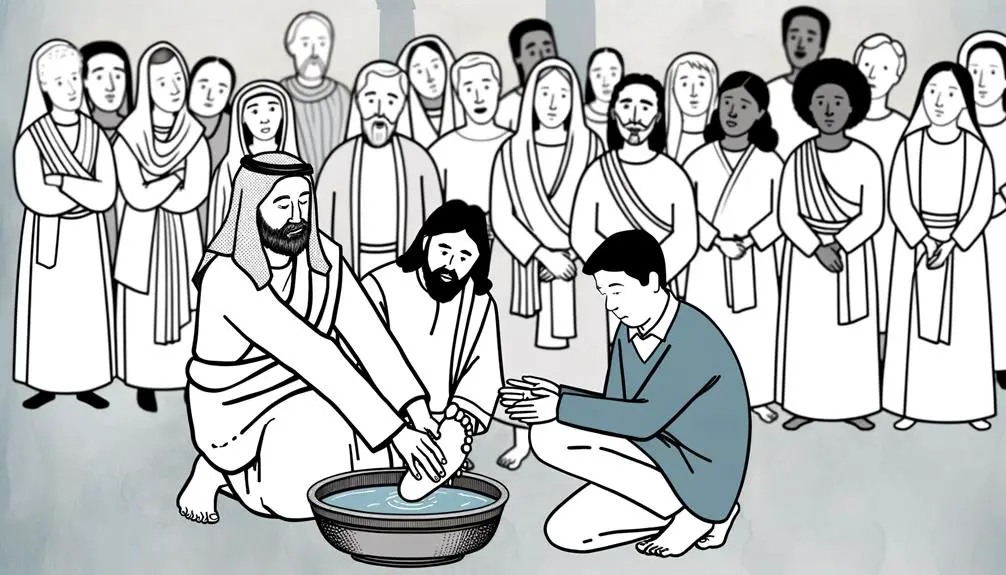Confront vainglory with biblical wisdom, exploring how scripture guides us from pride to humility.

Vainglory in the Bible
Like a shadow that follows one on a sunny day, vainglory subtly trails behind your every achievement, tempting you to bask in its deceptive light. You've likely encountered its whispers in moments of success, urging you to place your worth above others.
The Bible, rich in wisdom, confronts this allure head-on, offering both stark warnings and profound guidance. From the historical narratives that unfold the pitfalls of pride to Jesus' teachings on humility, scripture invites you into a deeper understanding.
Exploring these biblical perspectives can illuminate the path to cultivating a humility that stands firm against the seductions of vainglory, but where does one start?
Key Takeaways
- Vainglory, rooted in pride, seeks external validation, contrasting with biblical values of humility and intrinsic self-worth.
- Scriptural narratives, such as those of Nebuchadnezzar and Saul, illustrate the destructive consequences of arrogance and the rejection of vanity by God.
- Jesus and apostolic teachings emphasize humility and servant leadership as antidotes to vainglory, promoting spiritual growth and community harmony.
- Arrogance not only hinders personal and spiritual development but also leads to isolation, conflict, and divine discipline, underscoring the importance of humility.
The Nature of Vainglory

Vainglory, a nuanced form of pride, subtly entangles the human heart, leading you to seek unwarranted admiration for superficial achievements or qualities. It's a silent whisper that turns your gaze inward, focusing on self rather than the broader, more meaningful aspects of life. This phenomenon roots itself deeply within pride's origin, a foundational sin that distorts the perception of one's importance and value in the grand tapestry of existence.
You might wonder how this pertains to you in a world that constantly demands excellence and recognition. The answer lies in understanding the dual nature of pride and humility. Pride, particularly in the form of vainglory, feeds on the approval and applause of others, becoming a relentless hunger that's never truly satisfied. It's a precarious path that leads you away from genuine self-worth and towards an abyss of superficial validation.
Conversely, humility's reward offers a stark contrast. It invites you to appreciate the intrinsic value of your actions and character, independent of external accolades. Humility anchors you in the reality of your own humanity, recognizing both strengths and weaknesses with equal clarity. This grounded perspective fosters a sense of peace and contentment, liberating you from the insatiable demands of vainglory.
In this reflective journey, you're encouraged to confront the subtle tendrils of vainglory that may entangle your heart. By acknowledging pride's origin within yourself and embracing humility's reward, you pave the way for a more authentic and fulfilling existence, free from the empty allure of superficial praise.
Historical Examples in Scripture

As you explore historical examples of vainglory in the Bible, you encounter figures whose stories serve as stark warnings. Nebuchadnezzar's prideful fall, Herod's fatal arrogance, and Saul's disastrous vanity illustrate the perilous path of self-glorification.
These narratives underscore the consequences of prioritizing one's own esteem above divine will and the well-being of others.
Nebuchadnezzar's Prideful Fall
Nebuchadnezzar's downfall embodies a cautionary tale of pride's perilous consequences, as narrated in the Book of Daniel. You see, his story isn't just ancient history; it's a timeless warning. Here's why:
- Nebuchadnezzar's dreams served as divine warnings, yet his pride blinded him to their significance.
- His proclamation of Babylon's splendor as his own achievement ignored the divine hand that allowed his success.
- The dramatic transformation from king to beast underscores the severe repercussions of unchecked arrogance.
- His eventual recognition of divine sovereignty teaches humility's restorative power.
This narrative isn't merely about ancient royalty; it's a mirror reflecting the dangers of vanity that you might face today. Reflect on Nebuchadnezzar's journey, lest you fall into the same trap of pride.
Herod's Fatal Arrogance
ARTICLE TITLE: Vainglory in the Bible
PREVIOUS SUBTOPIC: 'Nebuchadnezzar's Prideful Fall'
CURRENT SUBTOPIC: 'Herod's Fatal Arrogance'
Turning our attention to another historical account, we encounter the story of Herod, whose fatal arrogance serves as a stark reminder of pride's destructive potential. His story, steeped in political manipulation, ends in Herod's demise, a consequence directly tied to his excessive pride.
Aspect |
Description |
Outcome |
|---|---|---|
Herod's Pride |
Excessive and blinding |
Downfall |
Public Acclaim |
Mistaken as divine acknowledgement |
Fatal arrogance |
Political Play |
Manipulation for power |
Isolation |
Reflect on Herod's tale, noting how his vainglory, intertwined with political scheming, not only isolated him but led to his catastrophic end. This narrative underscores the peril of letting pride overshadow humility and wisdom in leadership and personal conduct.
Saul's Disastrous Vanity
Shifting our focus, we now explore the tale of Saul, whose disastrous vanity offers another profound biblical lesson on the dangers of excessive pride. Saul's story is a classic example of how vainglory leads to self-destruction:
- Jealous Rage: Saul's envy of David's successes fueled a jealous rage, blinding him to rational thought.
- Unwise Decisions: His vanity guided him towards a series of unwise decisions, prioritizing personal vendettas over the well-being of his kingdom.
- Disobedience to God: Saul's pride led him to disobey divine commands, thinking he knew better.
- Loss of Kingship: Ultimately, his vainglory resulted in God rejecting Saul as king, a dire consequence of his arrogance.
This narrative serves as a cautionary tale about the perilous path of vanity, especially when it clouds judgment and leads away from divine instruction.
Jesus on Humility

Jesus consistently emphasized the importance of humility, teaching that it's not merely an admirable trait but a foundational aspect of one's character. He lived this principle through actions that starkly contrasted the societal norms of his time, where status and power were often sought after and revered. His approach to servant leadership, particularly exemplified in the act of washing his disciples' feet, serves as a profound model for humility. This act was revolutionary, challenging the existing social hierarchies and expectations of a leader's role. Jesus, in assuming the position of a servant, demonstrated that true leadership is rooted in serving others rather than asserting dominance over them.
This embodiment of humility wasn't just a lesson in servant leadership; it was a call to internalize humility as a way of life. Jesus' teachings and actions consistently pointed back to the heart, emphasizing that humility begins within and influences one's interaction with the world. He taught that it's not enough to perform acts of service; one must also cultivate a humble spirit, recognizing one's own limitations and the intrinsic value of others.
Reflecting on Jesus' teachings and actions, it's clear that humility, in his view, wasn't about self-deprecation but about understanding one's place in the broader context of humanity and creation. It's about recognizing that all people have inherent worth and treating them accordingly. In this light, humility becomes a powerful force for change, challenging societal norms and personal attitudes, leading to a more compassionate and equitable world.
Parables Addressing Pride

In exploring the theme of pride, one finds that several parables uniquely highlight its pitfalls and the virtue of its opposite, humility. These teachings, embedded within the biblical narratives, serve as profound reflections on human nature and moral conduct. They caution against the seductive lure of vanity and underscore the importance of cultivating a spirit of humility.
- The Parable of the Prodigal Son – This story exemplifies the Prodigal's arrogance in squandering his inheritance and his subsequent journey towards redemption and humility. It's a powerful illustration of how pride leads to downfall and how humility paves the way for reconciliation.
- The Parable of the Pharisee and the Tax Collector – Here, the Pharisees' hypocrisy is laid bare. The Pharisee prides himself on his religious observances, contrasting his actions with the tax collector's supposed moral inferiority. Yet, it's the tax collector's humble plea for mercy that's commended by Jesus, highlighting the value of humility over self-righteous pride.
- The Parable of the Rich Fool – This narrative warns against the pride of wealth and self-reliance. It tells of a man who, in his arrogance, plans to build larger barns to store his riches, only to be called to account by God. The parable teaches that life's true value doesn't reside in possessions but in a humble relationship with God.
- The Parable of the Talents – This parable encourages stewardship and humility in service. It critiques the prideful inaction born out of fear and laziness, urging followers to use their gifts humbly and wisely.
These parables, rich in wisdom, invite you to reflect on the destructive nature of pride and the transformative power of humility in your life.
Apostolic Warnings

You'll find that apostolic warnings against vainglory, especially in Paul's letters, underscore a pivotal spiritual struggle: humility versus pride.
Paul's cautious advice serves not only as guidance but as a critical reflection on the perils of self-exaltation within the early Christian communities.
This contrast highlights the necessity for believers to cultivate humility as a defense against the corrosive effects of pride.
Paul's Cautious Advice
Why did Paul emphasize caution in his letters, urging the early Christians to avoid vainglory and adhere to humility? His warnings were rooted in a profound understanding of human nature and the perils of pride. Paul knew that spiritual discipline and leadership humility were essential for maintaining the integrity of the Christian community.
Consider these points:
- Spiritual Discipline: Essential for guarding against the subtle encroachments of vainglory.
- Leadership Humility: A bulwark against the corruption of power and influence.
- Community Integrity: Preserved through mutual respect and humility.
- Personal Growth: Fostered in an environment where humility is valued over vainglory.
Paul's cautious advice reflects a deep understanding of the spiritual journey, emphasizing the need to cultivate humility and discipline to navigate the pitfalls of pride and vainglory effectively.
Humility Vs. Pride
Building on Paul's emphasis on humility, the apostolic warnings further explore the stark contrast between humility and pride, underscoring the profound implications each holds for the spiritual journey.
You're invited to reflect deeply on these warnings, as they highlight a critical spiritual dynamic: the inevitable prideful downfall versus the rewards of humility.
This juxtaposition isn't merely theoretical but is deeply rooted in biblical teachings, offering a clear guiding principle for your life.
Pride, often seen as the root of many spiritual failings, leads to a fall, while humility paves the way for spiritual growth and favor.
These apostolic messages serve as a mirror, urging you to examine your path, ensuring it's aligned with humility's rewarding journey rather than the treacherous slope of pride.
The Consequences of Arrogance

Often, the Bible illustrates how arrogance precipitates one's downfall, underscoring the perilous path it carves for individuals who indulge in overweening pride. This narrative isn't just a cautionary tale; it's a profound exploration of pride's pitfalls and arrogance's aftermath. You'll find that the consequences of arrogance are both far-reaching and deeply personal.
Here are four significant consequences that the Bible warns about:
- Isolation from Community: Arrogance often leads to a sense of superiority, causing you to push others away or dismiss valuable relationships. This isolation can deprive you of support and wisdom from your community.
- Conflict with Others: Your pride can blind you to the perspectives and needs of others, leading to unnecessary conflicts. These disputes often stem from a refusal to concede or compromise, further straining relationships.
- Spiritual Stagnation: Arrogance can create a barrier between you and spiritual growth. You might find yourself resistant to divine guidance or correction, believing you're beyond reproach or advice. This stagnation impedes your spiritual journey and relationship with the divine.
- Divine Discipline: The Bible frequently recounts stories where God intervenes to humble the proud. This divine discipline isn't just punitive but serves as a corrective measure, intended to realign one's path with humility and truth.
The trajectory of arrogance is a cautionary tale that invites reflection. It's not merely about avoiding negative outcomes; it's about recognizing the inherent value in humility and the dangers of veering too far into self-aggrandizement. Reflect on these consequences, and consider the subtle ways pride might be influencing your path.
Cultivating Biblical Humility

In contrast to the pitfalls of arrogance, cultivating biblical humility offers a path toward spiritual renewal and deeper community connections. This practice isn't just an ancient directive but holds significant modern applications, urging you to reflect on your actions and intentions in the light of humility. By embracing this virtue, you open yourself to growth, learning, and a more profound sense of belonging within your community.
Biblical humility isn't about self-deprecation; it's about recognizing your own limitations and the value of others. It invites you to listen more than you speak, to consider others' needs before your own, and to acknowledge that wisdom and strength come not from oneself alone but from a higher power. These principles challenge the self-centered ethos prevalent in much of today's culture, offering a counter-narrative that enriches both personal reflections and communal interactions.
Engaging with biblical humility requires a conscious effort. It means checking your motivations, practicing gratitude, and seeking to serve rather than be served. This approach doesn't just transform your spiritual life; it reshapes how you engage with the world. You become more empathetic, less judgmental, and more open to the perspectives of others.
As you reflect on your journey towards humility, consider the impact of your actions on those around you. How do they reflect the humility taught in the scriptures? How do they contribute to a community grounded in mutual respect and understanding? Embracing humility isn't a sign of weakness but a testament to the strength of character, fostering environments where everyone can thrive.
Frequently Asked Questions
How Does the Concept of Vainglory in the Bible Compare to Modern Understandings of Narcissism or Self-Obsession?
You're asking how ancient views of vainglory compare to today's ideas of narcissism, especially in the age of social media. Vainglory, historically rooted in excessive pride, mirrors modern self-obsession, yet the platforms have evolved.
Social media amplifies these traits, offering a broader stage for historical vanity to manifest. Reflecting on this, it's clear that while the essence remains the same, the expression of such traits has intensified with technological advancements.
Are There Any Biblical Characters Who Overcame Vainglory, and What Steps Did They Take to Achieve Humility?
Interestingly, 72% of leaders identify humility as a key factor in overcoming personal shortcomings. Reflecting on individuals who've transitioned from prideful downfall to humble leadership, one finds exemplary steps towards humility. They often start by acknowledging their vanity, seeking guidance, and embracing service over self-promotion.
These actions, mirroring historical figures' journeys, underscore the transformative power of humility in leadership and personal growth. Analyzing these transitions offers profound insights into overcoming self-obsession.
How Do Different Christian Denominations Interpret the Teachings on Vainglory in the Bible?
You'll find that Christian denominations interpret teachings on vainglory through their unique denominational doctrines, reflecting deep historical interpretations. These perspectives vary, from viewing it as a minor fault to a serious sin.
The analytical lens applied by each tradition uncovers layers of meaning, encouraging humility. Reflectively, this scholarly approach demonstrates how denominations historically adapt and mold their understanding of vainglory, balancing between ancient scriptural insights and contemporary moral guidance.
Can Vainglory Ever Be Considered a Positive Trait in Any Context Within Biblical Teachings?
You're asking if a trait often seen as the root of all evil could somehow shine as a beacon of positivity. In exploring this enigma, it's pivotal to distinguish between positive pride and vainglory.
While the former can fuel one's spiritual growth, pushing them towards acts of kindness and humility, the latter typically veers away from biblical teachings.
Analytically, the concept of vainglory, when scrutinized, seldom aligns with the promotion of genuine, spiritually enriching pride.
How Does the Struggle Against Vainglory Manifest in Everyday Life for Contemporary Christians, and What Practical Advice Does the Bible Offer?
You face vainglory daily, especially with social media's influence, tempting you to seek validation. To combat this, the Bible suggests focusing on humility and selflessness.
Engaging in community service opportunities is practical advice, redirecting attention from oneself to the needs of others. This act of service not only combats vainglory but enriches your spiritual journey, reflecting a life lived in accordance with biblical teachings on humility and love.
Conclusion
In conclusion, the Bible vividly illustrates that vainglory is a slippery slope leading away from spiritual enlightenment and towards spiritual bankruptcy. Through historical narratives, parables, and apostolic warnings, Scripture consistently advocates for humility over pride.
Cultivating biblical humility isn't just about avoiding the pitfalls of arrogance; it's about embracing a life that reflects divine wisdom and grace. Remember, pride comes before a fall, and in the realm of spirituality, this is a precipice we're wise to steer clear of.



Sign up